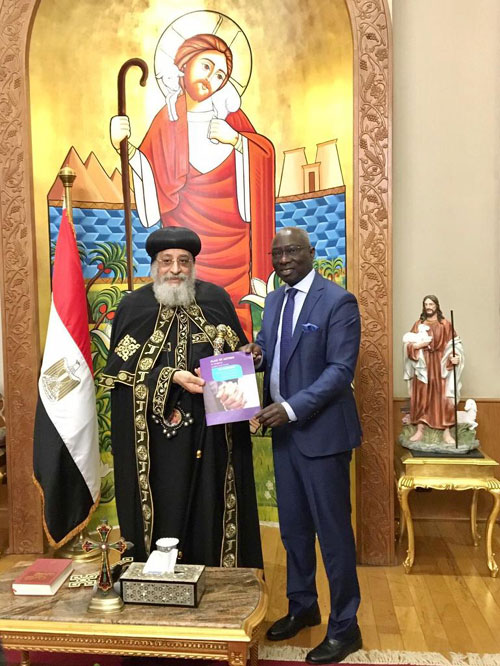In Cairo this week to take part in a conference on the freedom of faith and worship organised by the Italian Embassy, the United Nations Special Adviser on the Prevention of Genocide held a round of meetings with official and religious leaders to discuss Egypt’s engagement in implementing the UN Plan of Action to promote religious tolerance.
On Monday Dieng met with the grand imam of Al-Azhar, Ahmed Al-Tayeb. He told Al-Ahram Weekly he had discussed with Al-Tayeb ways to incorporate the principles of the UN plan into Al-Azhar’s curricula.
The plan of action foregrounds the prevention of incitement to violent extremism and gender-based violence and underlines the need to enhance education and capacity building and promote inter-faith dialogue in order to build more peaceful and inclusive societies.
Given its outreach to Muslim countries around the world, Dieng said Al-Azhar is an important institution to work with on the promotion of the plan to promote tolerance and prevent incitement that could lead to hate crimes.

Dieng and the pope of the Coptic Orthodox church Tawadros II
“The grand imam, who has been working closely with [Roman Catholic] Pope Francis, is very committed and promised that the principles of the plan will be integrated in the curricula of Al-Azhar,” Deing said.
On Wednesday Dieng was scheduled to meet with Pope Tawadros. “Working against incitement has to be on all fronts and at all levels,” he said.
According to Dieng, it is unwise to assume any society is fully immune to the repercussions of incitement.
Since the launch of the plan of action in 2017 Dieng says its implementation has become increasingly necessary “all over the world”.
“Incitement is not specific to any region or religion. It is not just about the Middle East or Africa. During the past few years we have seen a disturbing increase in anti-Semitism and Islamophobia in some Western countries.”
The UN official said it is a mistake to blame the situation on the refugee crisis.
“You cannot blame it on refugees. They are being used as a scapegoat by populist leaders.”
“It is very worrying when you monitor the hate speech being used today against refugees in some countries. It brings back memories of Nazi incitement in the early 1930s,” said Dieng.
While it is crucial to work on resolving the problems of refugees, until political problems in countries like Syria or Libya are sorted out they must be spared from incitement that could aggravate the ordeal they are passing through, said the UN official.
Host communities clearly have responsibilities towards refugees, Dieng argued – “I saw this in Bangladesh which hosted one of the largest refugee groups, around 800,000 Rohingyas who fled Myanmar to neighbouring Bangladesh” — he said, but the international community must also provide support for countries hosting refugees.
The Sahel/Sahara zone also merits the attention of the international community, especially with the spill-over of refugees from Mali to neighbouring Burkina Faso.
“I think the humanitarian crises in Syria and in Sahel are pretty similar and they both require a lot of attention,” Dieng said.
Failure to live up to the challenges creates room for militant groups like the Islamic State (IS) to manipulate the situation and threatens a repeat of the horrifying situation that erupted in Sinjar when IS took over the area forcing thousands of the Yazidi minority to flee into the mountains under dire conditions and enslaving others, leading to “the horrendous images of female slavery that shockingly emerged in the 21st century.
“It is very important to ensure that IS does not re-surface, in Iraq, Mali, Libya or anywhere else. And there is a crucial role for religious leaders to play to prevent this from happening.”
The promotion of freedom of faith and freedom of worship is essential in this respect. If people come to truly accept freedom of faith and worship then there is less room for incitement and the kinds of crimes to which it leads.
*A version of this article appears in print in the 20 February, 2020 edition of Al-Ahram Weekly under the title: Promoting tolerance
Short link: